Anti-racism protests and the COVID-19 pandemic have transformed the 2020 political landscape permanently, according to the new class of Georgetown Institute of Politics and Public Service fellows, who plan to facilitate conversations about these issues in their discussion groups and programming this fall.
The fall 2020 class spoke with campus media outlets in a Sept. 10 virtual press event. The fellows are Faiz Shakir (LAW ’06), who directed Sen. Bernie Sanders’ (I-Vt.) 2020 presidential campaign; Lis Smith, the senior communications adviser for Pete Buttigieg’s presidential campaign; author and CNN commentator Mary Katharine Ham; Trump administration senior adviser Kevin Hassett; former Rep. Mia Love (R-Utah); and Errin Haines, editor at large of The 19th, a news organization focused on gender and politics.
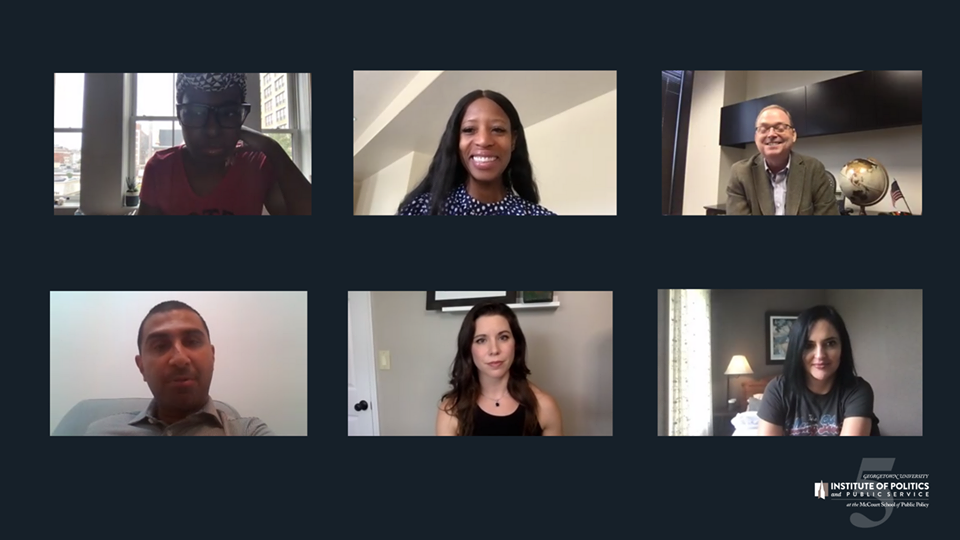
The fall 2020 semester marks the 11th class of GU Politics fellows, as the program celebrates its fifth anniversary. The program invites professionals involved in government and advocacy to share their experiences and expertise with the Georgetown University community. The fellows will host open weekly discussion sessions and office hours online, among other events, for students seeking to learn more about practitioners’ experiences and perspectives on politics.
Below is a transcript of the interview edited for length and clarity.
One part of this fellowship is the discussion groups that you are going to lead, can you all just go over briefly what your plans are for these discussion groups and the topics that you are going to cover?
Smith: Mine is mastering the art of communications and what it’s going to look at is everything in campaigns from how you develop a message to how you work the media and how you capitalize on big news moments like debates.
Haines: My discussion group is on race, gender and the 2020 election. So, looking back at the historically diverse primary cycle, the very extraordinary veepstakes process and what it means that we have two white men in their seventies vying for the presidency, despite those dynamics. We are going to talk about the myth of electability and what the future of who and where we are as a country is, based on these two issues that really factored into the most consequential election of our time.
Shakir: I’ll be talking about building a campaign, with lessons that I learned personally, of all the component pieces and the nuts and bolts that go into architecting a campaign — some of the things that are more obvious and things that are less obvious. And then we are going to have the good fortune of living [through] a prominent campaign in real-time. So assessing those two campaigns, Trump and Biden, and then hopefully having an opportunity to do a post-game analysis as well in the back end.
Love: I am going to be discussing the inside-inside-baseball of Washington, in terms of interacting with other members and other groups and being comfortable being in uncomfortable situations, so getting yourself comfortable in uncomfortable situations, navigating false choices. Many times the choices that we have are pretty binary, it’s usually one or the other, and there’s so many different things in between and talking about just how to get away from the either/or, which a lot of policy is based on.
I am going to be discussing a little of race and politics, being the only Black Republican woman ever elected to Congress, I think I would be remiss not to talk about some of my experiences, not just with members on the other side of the aisle, but also members within my party. I think that would be interesting. I’m going to talk about the importance of storytelling and being personal, and allies and enemies, like foreign policy. And also how to make Washington smaller and your voice bigger. So, I’ll be covering a wide variety of things but based on my experiences and what I think and how to share my experiences with students.
Ham: I’m doing a semester on the love of free speech and the idea that all of the equality and social justice that we are seeking we can’t get to without embracing a bedrock of really raucous and sometimes uncomfortable free speech exchanges. That’s not just for the press, that’s one thing we get very focused on, as we should sometimes on, for instance, the president making news by going after the press.
But it goes to normal folks as well, who feel increasingly concerned about voicing their political opinions. The most recent national survey — but you can always find one — is Cato, but it says 62% of Americans, fairly a majority of each Democrats, independents and Republicans, say that they are scared to say some of their political opinions for fear of what might happen. So, it’s getting harder and harder, but it can be really fun and enriching. So, my mission for several years now has been to get other folks to join me in the fun. And young people often seem very willing to do that, especially on college campuses when I get a chance to talk to them. So, I’m excited about it.
Hassett: Our session is really getting to talk about economic policy and how you sort of turn it into law. What actually can change the world and what should have but didn’t and what are the failures and successes along the way, from both parties really. And I think that the main objective for me in this seminar is to help people who want to make a difference sort of identify what their objectives are about how they want to make a difference and then to help them achieve their own objectives.
How have the Black Lives Matter movement and issues of racial justice factored into your creation of discussion group curriculum?
Shakir: Especially as you get into what Bernie did right, what Bernie did less well than others, you obviously want to have an honest and good conversation around the role that race played, which I think is a little bit more complicated and nuanced. In that vein, especially in the ideological agenda, especially along these core economic issues have very deep racial implications, it happens to be that those who have been most screwed in the current economic environment are in places where there are food deserts, that don’t have hospitals, that don’t have health centers, who have to go to work in a variety of different stressful work environments that put their lives at risk. It’s no surprise that everything is being felt unequally in our society, but when you add the layer of race into it you understand that the impacts are deeply more profound given the color of your skin and oftentimes the lot that you’re awarded.
Haines: Obviously that’s pretty much what my whole discussion group is about, and it is because I went into 2020 saying that race and gender were not just a story of the 2020 election, they were the story of the 2020 election. That was true even for me before the dual pandemics of coronavirus and systemic racism. So, I think the Black Lives Matter movement absolutely shaped this race going into 2020. It was amazing for me, even thinking back to February 2019 when reparations was something that Democratic primary candidates had to answer as to whether or not they believed in it and as to whether or not they thought that it was something that should happen. If you had told me that something that had been a fringe issue for so long in our American politics was going to be front and center in the 2020 Democratic primary, I wouldn’t have believed it, but here we were.
So, what that really told me was that questions of white privilege and institutional racism were absolutely on the ballot for voters. And that is something that feels even more urgent as the unabated killing of unarmed Black people in this country by law enforcement continues, even in the midst of a global public health and economic crisis. That is absolutely going to be a huge part of my discussion group, but also with the intersection of gender as well. Black women, for example, we know have long been the backbone of the Democratic Party, but we have seen that kind of play out in this election in so many ways. Kamala Harris being the lone Black woman who ran for president and who now is potentially going to be making history as the first woman vice president but also as the first Black person to be nominated for vice president by a major party. So, there’s a lot of ways I think that the modern protest movement has shaped this election in particular, and I think that we have seen its maturity showing up in this race in a lot of ways.
Ham: I don’t want to preempt my students’ opinions, because I really would like to hear them, but I think that it’s fair to say that for many young people, or at least for a good chunk of young people, it’s an open question whether freedom of speech and the open embrace of a lot of different opinions with a wide berth is actually beneficial to people of color or to minorities, or whether that is something that can be more hurtful than helpful. I am of the opinion that freedom of speech as a bedrock value is important for achieving social justice in many forms, and that the way that we come to actual solutions is that we are able to talk about things constructively.
But I recognize that that is an open question for many young people, and it’s the reason that I do what I do. It’s to get their thoughts on whether this is something that they want to be part of their lives and something that is important to our society or not, and that it really can be tough for people to enter these conversations. I don’t really want to broadcast so much of my opinion or assume too much of theirs, but I think that’s where it comes into this discussion.
Obviously one of the other things in politics that you can’t not talk about right now is COVID and the ongoing pandemic. What aspect of politics or political journalism has changed the most because of COVID-19? And what are some pieces of advice you can offer for students who are trying to get involved in politics now?
Smith: It’s changed basically everything about politics. There’s no more in-person campaigning. It’s harder for reporters to get one-on-ones or face time with candidates. Voters are not going to see the candidates up close before November, as expected. We obviously did not have these multiple thousand-people conventions. You know, I think that one upside to it is candidates are spending less time flying all over the country for one hour event here, one hour fundraiser here. So, it saves them time, it saves them money, it saves them energy, which is something that is an important consideration when you have two 70-something-year-old candidates.
I think one interesting thing is that it has forced the parties and forced campaigns to innovate to figure out and find new ways of campaigning. And I think what we’ve learned in the process of dealing with this global pandemic is that some of the ways that we’ve been conducting political campaigns are completely out of date and completely inefficient. And the fact that we had to grapple with this pandemic is something that I think will produce important innovations that will save us a lot of time, energy, and figure out more efficient ways to reach voters, get our message out. As far as advice for students to how to get involved, the same is with anything else. Reach out to local campaigns — and this is not just about a presidential race. So reach out to your local campaigns and see if they need help in terms of online organizing, phone calls, things like that. I think that just because it’s not in person doesn’t mean that they still won’t need a lot of help and there are a lot of ways to do voter contact that aren’t impacted by the pandemic.
Hassett: I think that the interesting thing about this year is that without those big rallies, there’s a question of, is there a way, especially for you guys maybe who aren’t a part of social network that contributes to your political cause, is there a way to create a virtual version of like the tea party rally or whatever the version of it on the other side is. But I think that that’s something that is really going to have a big impact on the election. If you look at the size of the rallies, say that President Obama had when he ran for office, I’m sure that a massive amount of networking happened at those rallies and people made lifelong friendships and stayed in contact with each other and organized each other to get folks out to vote. And I think that because of this virtual world that we’re living in that the social network construction is going to be much weaker, but that if you can innovate in that space and figure out ways to do it, then you can really potentially accomplish a lot.
Love: I’m actually going to agree with all my fellows on this. I think that this gives either party or both parties an opportunity to rise to the occasion. When Obama won, he was incredibly innovative on how he campaigned, on how he reached people and I think that if you’re going to try and say, “Well because this happens, the result is going to be this,” that’s already setting yourself up for failure. If you’re trying to campaign the ways that have been done in the past, that’s actually setting yourself up, and so I think that the person that writes history is going to be the one that can be really effective and innovative. And I don’t think we fully know what the answer of that is until — I’m not going to say election night because I have a feeling that we’re going to go beyond election night — but I think that there’s a lot that we’re going to learn from that and hindsight’s always 20/20. It will obviously change the way we do things from this point on. I don’t think that we’re going to go back to the way that we campaigned in the previous election. I think that things are going to have to change.
Ham: This is a half a journalism observation, half a politics observation. But, to Lis’s point, this is blowing up so much of the former way of doing things. And not to sound like a Silicon Valley d-bag, but it is disruption in action, that’s what’s happening. We’re seeing paradigm-shifting in all of these different industries, and politics is about people and their problems. And there are new problems that a lot of people have not experienced before going on right now, and there are new stories to tell. Telling those stories and finding those problems can be an avenue, I think, into a new world of politics and journalism right now, because, frankly, politics can be a bubble. There’s so many problems that people are experiencing right now that are genuinely kind of new and strange that I think some politicians and some people in politics circles used to doing things the old way aren’t even recognizing the problem they need to be solving. So, finding those stories and those people and the ways that they are coping and or hurting in new ways, it’s going to be a whole new world of stories to tell and things to discover and ways to serve people.
Haines: The pandemic has certainly changed the way that political journalism has happened. We don’t have campaign events to cover, we don’t have voters, you know, like fish in a barrel, to just interview right in front of us. We actually have to do the work of finding them, but it could not be more important to know what the temperature of this electorate is in this moment, because the pandemic is absolutely political and it’s on the ballot for some people. We need to know the ways in which that’s impacting their lives and how that impact is factoring into their politics right now. Because the pandemic is what this election is about, and as we get closer and closer to November, I feel like the pandemic is only going to become more relevant for people. I mean this week alone, you have millions of parents that are struggling with either virtual or in-person learning as they maybe have a job to go back to, or maybe they don’t, in an office setting as well. That’s real-life stuff for people, like, that is the kitchen table issue for people right now. Figuring out how to reach them is super important.
What is the most tired take of this election cycle?
Shakir: This election cycle has been more lived online than any prior election cycle, and all are probably going to be more lived online. I think it creates a weird bubble of life unto itself, that if you sat there and listened and watched all your friends tweet and Facebook stuff you could get one perspective of how this campaign and cycle was going, and that there was, at the end of the day, votes and caucuses and primaries that might have driven to a different outcome than you assumed and presumed. I think that’s one of the takes. People have said that Twitter just isn’t real life, but I think it was being felt in a more acute way this time around because it really pierced peoples’ realities in a more expedited manner.
Smith: I completely agree with that, and that was an experience that I certainly had in the 2020 primaries. Not only that, it wasn’t just that it affected the campaigns, who all sort of lived in their echo chambers, because they would just read people saying “yas queen” whatever, not realizing that a few people on Twitter doesn’t mean that your candidate is taking off in Iowa. But it also impacted the journalists and the reporting, where I almost felt like reporters and editors became more like, “Who’s on Twitter,” and that it was about who was on Twitter and that they allowed themselves to believe that the Twitter narrative was equal to the on-the-ground narrative. And I think what that exposes is why it is really important to do on-the-ground reporting. If you were just sitting at your computer, hearing from the same people over and over again, you never would have understood why Pete Buttigieg was going win Iowa. It never would have come through. You would have thought, “Oh my God, everyone online hates him.” But it was completely discordant with what we saw happening on the ground. I think the other thing that I would add as a take, I think now it’s thankfully fading is this take that, you know, Trump is some sort of evil genius playing 3D chess. I think that what we have seen is that, no, he’s not a particularly strategic guy. He’s a pretty erratic, irrational guy, and it’s not an accurate read of the situation to think that he or his team are particularly cunning.








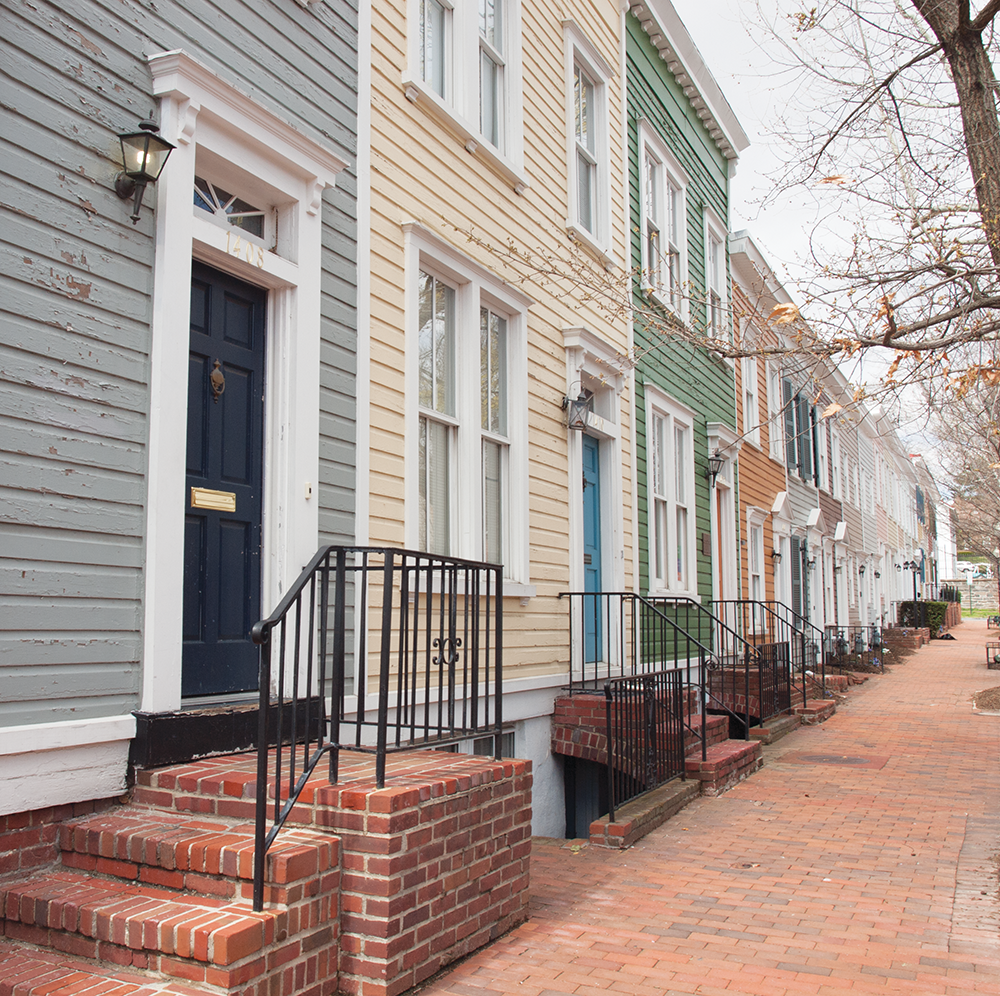
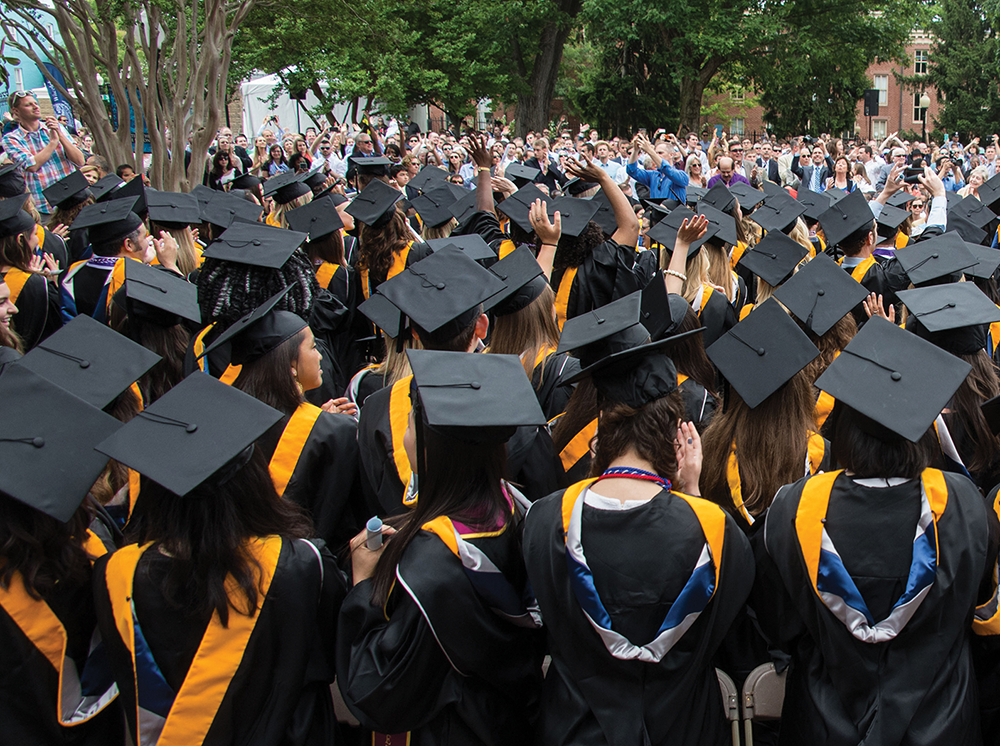
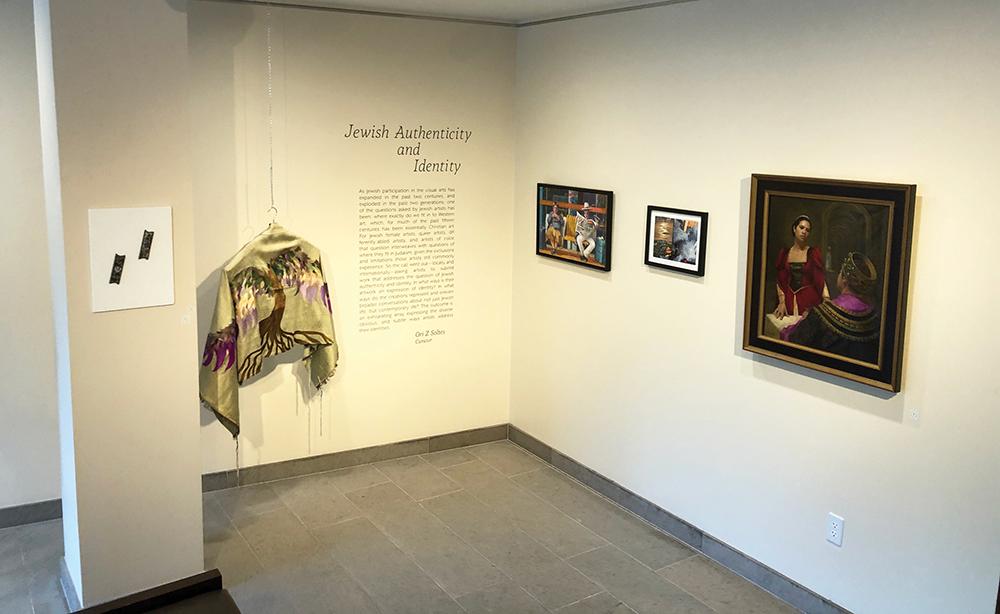
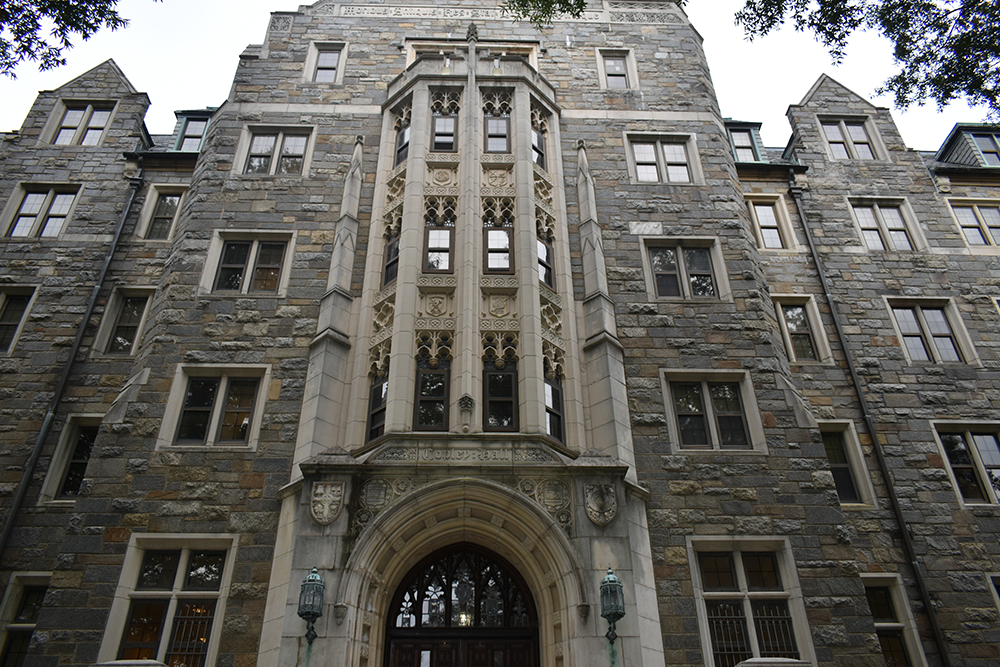
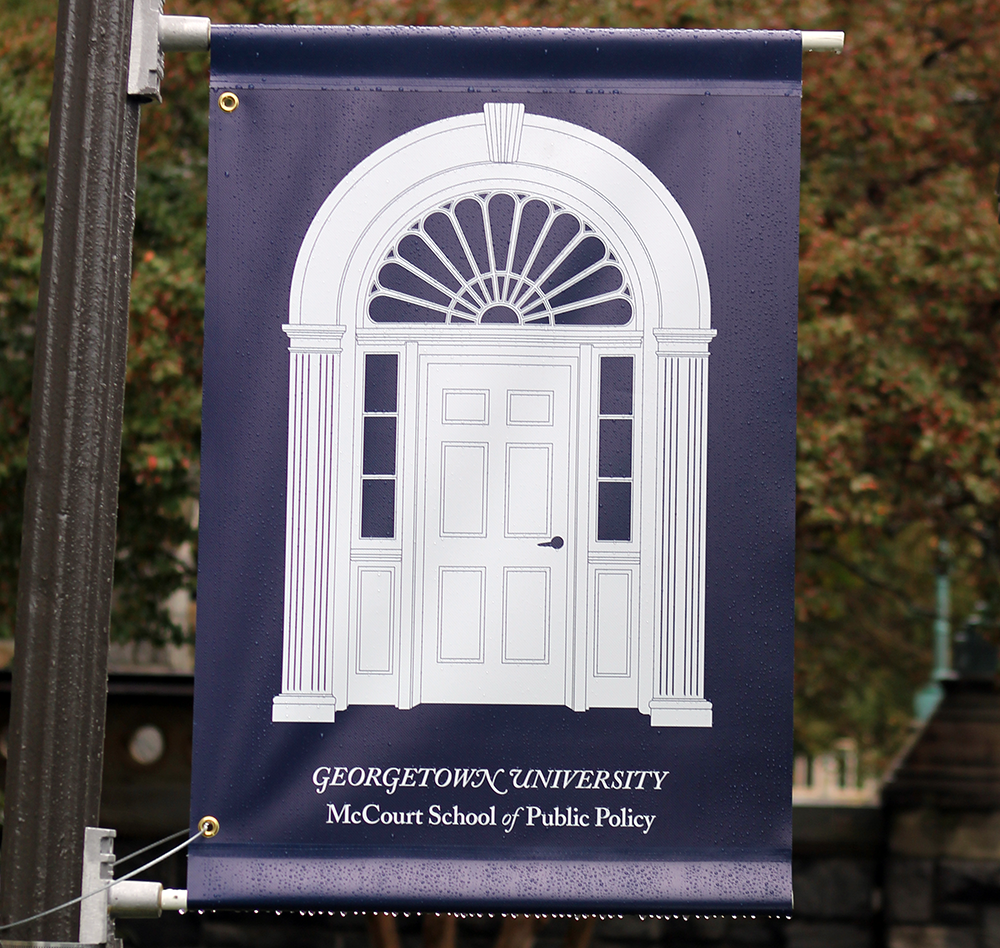
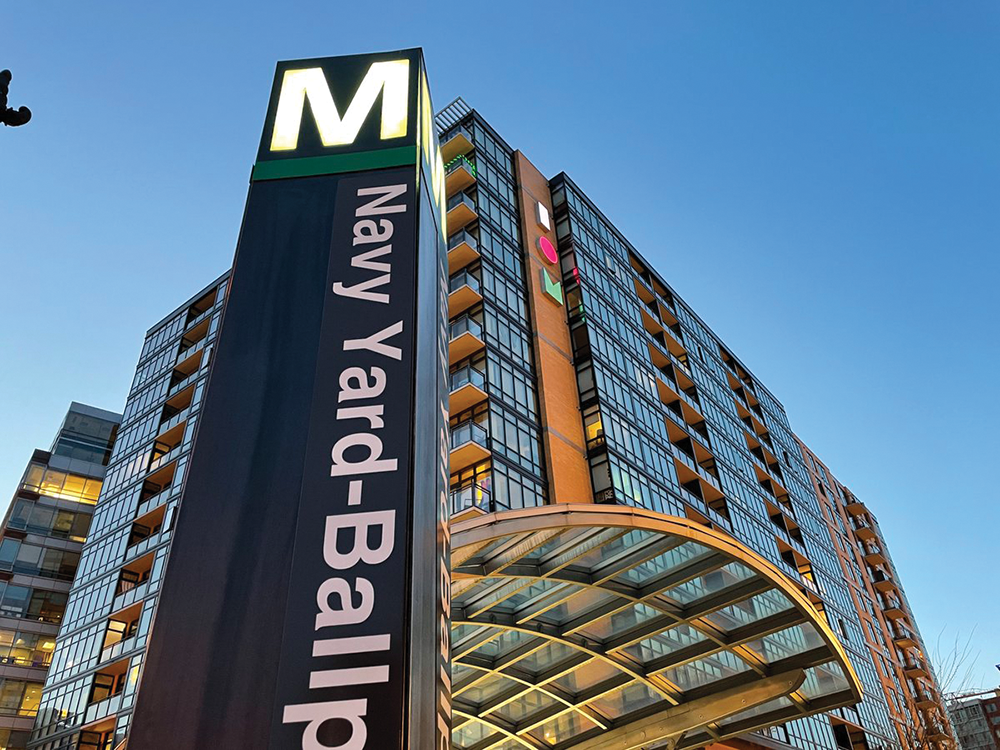







Henry Messer • Sep 14, 2020 at 5:45 pm
Mr. Elleithee, please explain to me what Biden meant when he commented on the two officers being shot in California. He said he would ban all assault weapons and large capacity clips. That was a handgun used in this incident.